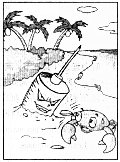题目内容
7.It is,perhaps,no accident that many of the outstanding figures of the past were amazingly versatile men.Right up until very recent times,it was possible for an intelligent person to be familiar with almost every branch of knowledge.Thus,men of genius like Leonardo da Cinci or Sir Philip Sidney,engaged in many careers at once as a matter of course.Da Vinci was so busy with his numerous inventions,that he hardly found the time to complete his paintings; Sidney,who died in battle when he was only thirty-two years old,was not only a great soldier,but a brilliant scholar and poet as well.Both these men came very near to fulfilling the Renaissance (文艺复兴) ideal of the‘universal man',the man who was expert at everything.Today,we rarely,if ever,hear that a musician has just invented a new type of space rocket.Knowledge has become divided and subdivided into countless,narrowly-defined fields.The specialist is respected; the versatile person,far from being admired,is more often regarded with distrust.The modern world is a world of highly-skilled‘experts'who have had to devote the greater part of their lives to a very limited field of study in order to compete with their fellows.
With this high degree of specialization,the frontiers of knowledge are steadily being pushed back more rapidly than ever before.But this has not been achieved without considerable cost.The scientist,who outside his own particular subject is little more than a fool,is a modern phenomenon; as is the man of letters who is hardly aware of the rapid progress that has been made in technology.Similarly,specialization has indirectly affected quite ordinary people in every walk of life.Many activities which were once pursued (追求) for their own sakes,are often given up in despair:they require techniques,the experts tell us,which take a lifetime to master.Why learn to play the piano,when you can listen to the world's greatest pianists in your own drawing-room?
Little by little,we are becoming more and more separate from each other.It is almost impossible to talk to your neighbor about his job,even if he is engaged in roughly the same work as you are.The Royal Society in Britain includes among its members only the most admirable scientists in the country.Yet it is highly confusing to find that even here,as one of its fellows put it,at an academic(学术的) lecture only 10% of the members can understand 50% of what is being said!
57.The underlined expression"versatile men"refers toC.
A.highly-skilled specialists B.brilliant scholars
C.talented people D.admirable scientists
58.According to the passage,if da Vinci and Sydney lived in the modern world,D.
A.they would enjoy a better reputation
B.people would look up to them in amazement
C.they might have made greater achievements
D.they might not be truly appreciated by people
59.By quoting"at lecture only 10% of the members can understand 50% of what is being said",the writer wants to show that the high-degree specializationD.
A.has made scientists unwilling to share their achievements
B.has widened the academic gap between scientists in the same field
C.has indirectly affected people in every walk of life
D.has brought about a significant increase in interpersonal distance
60.The writer of the passage takes aBattitude towards the high-degree specialization.
A.pessimistic B.negative C.supportive D.friendly.
分析 这是一篇文化类文章,作者通过对比过去和现在的天才,发现过去的天才是多才多艺的,而现在的专家更精深,局限于一个有限的领域.
解答 CDDB
57C猜测词义题.根据文章第一 段men of genius like Leonardo da Cinci or Sir Philip Sidney,可知像达芬奇一样的天才都是多才多艺的,故选C.
58D 细节理解题.根据文章第二 段the versatile person,far from being admired,is more often regarded with distrust. 可知多才多艺的人通常会被别人认为是不可信任的,故选D,他们或许不会被人们赏识.
59D推理判断题.根据文章最后一段The Royal Society in Britain includes among its members only the most admirable scientists in the country.Yet it is highly confusing to find that 可知英国皇家学会虽然有这个国家最让人崇拜的科学家,但是由于专业精深的程度导致只有10%的人理解演讲50%的内容,说明人际之间专业程度的差异在加深,故选D.
60B主旨大议题.根据文章第三 段With this high degree of specialization,the frontiers of knowledge are steadily being pushed back more rapidly than ever before. 可知高度专业化导致知识前沿相比之前更落后,因此作者对高度专业化持否定的态度,故选B.
点评 学生需要认真阅读原文,把握文章大意,对文章脉络有整体的了解,能仔细查找文中细节,并能根据文章内容进行合理的推测判断.

---______.They are both expensive and of little use.( )
| A. | None | B. | Neither | C. | Nothing | D. | No one |
| A. | anything,everything | B. | nothing,everything | ||
| C. | everything,anything | D. | none,everything |
| A. | in spite of | B. | on the other hand | ||
| C. | so long as | D. | on the whole |
| A. | are being used | B. | have been used | C. | had been used | D. | has been used |
 A Terrible Surprise at the Beach
A Terrible Surprise at the Beach 